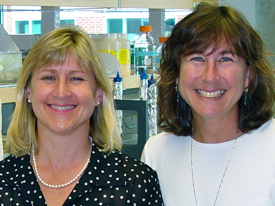Polar Opposites
They share a first name and a passion for oceanography, but beginning in late January, professors Deborah Bronk and Deborah Steinberg of the Virginia Institute of Marine Science will be polar opposites—literally.
Bronk, an international expert in ocean nitrogen, is scheduled to arrive in Barrow Alaska on January 25th to lead a team of VIMS graduate students and technicians studying the Arctic coastal ecosystem.
Steinberg, internationally recognized for her work on ocean carbon and zooplankton, will be leading her own team of graduate students and technicians into their fourth week of shipboard research in the waters off the Antarctic Peninsula.

Bronk’s research team, the self-styled “nitrogen snow ninjas,” will be working at 71 degrees north latitude in nearly continuous darkness during the depth of the Arctic winter. Steinberg’s zooplankton crew will be working between 65 and 70 degrees south latitude in nearly continuous daylight during the height of the Antarctic summer. The distance between the two research sites, as the arctic tern flies, is 10,289 miles.
What the two research teams share is their focus on better understanding how climate change is affecting polar ecosystems. Polar regions are warming faster than anywhere else on Earth, with a rise in average winter temperatures during the last 50 years of more than 7°F in the Arctic and more than 11°F along the Antarctic Peninsula.
Bronk’s team is investigating how warmer temperatures, increased runoff, and larger ice-free areas will affect the marine microbial community, and how changes there might ripple up the food web to affect larger organisms and native peoples. They also aim to investigate how climate change will affect the region’s role in the global carbon cycle. The 3-year endeavor, with one spring, summer, and winter field season each year, is funded by the U.S. National Science Foundation.
Steinberg's team, part of the National Science Foundation’s Long-Term Ecological Research Program at the U.S. Palmer Research Station, studies how warming is affecting zooplankton—small animals such as krill that eat phytoplankton and in turn are preyed on by fish, penguins, and whales. The team is particularly interested in how warming might change the species of zooplankton that dominate these waters, and how such changes will affect the "biological pump"—a process that can move carbon dioxide from the atmosphere to the deep sea, where it contributes nothing to global warming.
